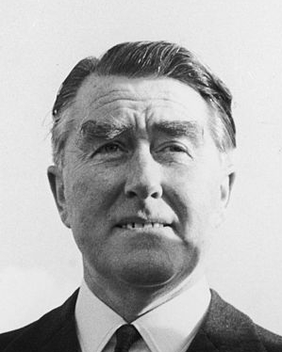Paddy Roy Bates facts for kids
Quick facts for kids
Roy Bates
|
|
|---|---|

Bates in 1966
|
|
| Prince of Sealand (Micronation) |
|
| In office 2 September 1967 – 9 October 2012 |
|
| Preceded by | Position established |
| Succeeded by | Michael Bates |
| Personal details | |
| Born |
Patrick Roy Bates
29 August 1921 Ealing, West London, England |
| Died | 9 October 2012 (aged 91) Leigh-on-Sea, Essex, England |
| Spouse |
Joan Collins
(m. 1949) |
| Children |
|
| Occupation | Pirate radio entrepreneur |
| Military career | |
| Allegiance | |
| Service/ |
|
| Years of service | c. 1940 |
| Rank | Major |
| Battles/wars | World War II |
Patrick Roy Bates (born August 29, 1921 – died October 9, 2012) was a British adventurer. He was also known as Prince Roy of Sealand. He became famous for starting his own tiny 'country' called the Principality of Sealand. This is a special kind of place called a micronation, which is a small area that claims to be an independent country but isn't recognized by most other nations.
Contents
Early Life and Military Service
Roy Bates was born in Ealing, London, in 1921. When he was older, he joined the British Army and fought in World War II. He became a major and was injured several times during his service. He took part in important battles, including the Battle of Monte Cassino in Italy and campaigns in North Africa. After the war, he worked as a fisherman for a while.
Starting a Radio Station
Later, Roy Bates decided to try something new: broadcasting radio. In the 1960s, he got involved with "pirate radio" stations. These were radio stations that broadcast without a government license.
Radio Essex: Broadcasting from a Fort
In 1965, Bates took over an old military platform called Knock John Tower. This was one of the Maunsell Sea Forts, which were special forts built in the sea during World War II to defend Britain.
From Knock John Tower, Bates started his own pirate radio station called Radio Essex. It was very popular because it was the first pirate station to broadcast music and entertainment 24 hours a day.
Legal Challenges and Changes
In October 1966, the station's name changed to Britain's Better Music Station (BBMS). This happened after Bates faced legal trouble for broadcasting without permission. He was fined money for breaking the law. Because of money problems, BBMS stopped broadcasting on Christmas Day in 1966.
Creating the Principality of Sealand
Even though his radio station stopped, Roy Bates wasn't ready to give up. He moved his equipment to another Maunsell Fort called Roughs Tower. This fort was even further out at sea, beyond where Britain's official waters ended at the time. He planned to start broadcasting again, but he never did.
Declaring Independence
On August 14, 1967, a new law was passed in Britain that made it illegal to broadcast from sea platforms like Roughs Tower. Just 19 days later, on September 2, 1967, Roy Bates made a big announcement. He declared that Roughs Tower was now an independent country! He called it the Principality of Sealand.
Defending Sealand
Not everyone was happy about Sealand. Another pirate radio owner, Ronan O'Rahilly, tried to take over the platform. But Bates and his friends fought them off.
Later, the Royal Navy (Britain's navy) came near Roughs Tower. Roy Bates's son, Michael, fired warning shots to keep them away from what he claimed were Sealand's waters. Bates and Michael were arrested and taken to a British court. However, the court decided it couldn't judge the case because Roughs Tower was outside Britain's waters. Roy Bates saw this as a sign that Sealand was being recognized as a real place!
Seven years later, Roy Bates created a constitution (a set of rules), a flag, and even a national anthem for the Principality of Sealand.
The 1978 Incident
In 1978, a German businessman named Alexander Achenbach, along with some other people, tried to take over Sealand. They even took Roy Bates's son, Michael, as a hostage!
Roy Bates and his supporters launched a surprise attack to get the fort back. They managed to free Michael and held the invaders as prisoners. One of the German men had accepted a Sealand passport, so Bates claimed he was a citizen of Sealand and charged him with treason (betraying his country). The others were released.
Germany then sent a diplomat (a government representative) to Britain to ask for help, but Britain said they couldn't get involved because it was outside their jurisdiction. So, Germany sent a diplomat directly to Sealand to negotiate for the prisoner's release. Roy Bates saw this direct negotiation as another sign that Sealand was being recognized as a country, even though Germany denied it.
Later Life and Legacy
In his later years, Roy Bates retired and lived in England. His son, Michael, took over the day-to-day running of Sealand as "Prince Regent," even though he also lived in Britain.
Roy Bates passed away peacefully on October 9, 2012, at a care home in Leigh-on-Sea, Essex. He had been living with Alzheimer's for several years. His funeral was held in Southend-on-Sea.
He was survived by his wife, Joan, and their children, Michael and Penny. Michael remembered his father as a "huge, huge character." Roy Bates once said in an interview, "I might die young or I might die old, but I will never die of boredom."
See also
 In Spanish: Paddy Roy Bates para niños
In Spanish: Paddy Roy Bates para niños
 | Lonnie Johnson |
 | Granville Woods |
 | Lewis Howard Latimer |
 | James West |

